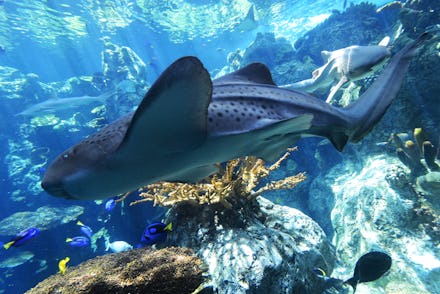This misandrist zebra shark had babies without a mate

A lonely sea creature has achieved every misandrist's dream: She's made men obsolete.
The lucky lady is Leonie, a female zebra shark who had three offspring in early 2016 after being completely isolated from males for roughly four years.
According to New Scientist, Leonie was first paired with a male zebra shark at an Australian aquarium in 1999, at which time the couple had over two dozen babies. In 2012, aquarium staff moved Leonie's partner to another tank, leaving her all by herself — which is why scientists were stunned when she gave birth last year.
Was it immaculate conception? Asexual reproduction? Evolution finally doing right by women?
University of Queensland researcher Christine Dudgeon and her colleagues have floated some theories.
At first, it seemed Leonie might have been saving sperm from her last male partner to use later on to help her conceive. But after genetic testing, researchers found that Leonie's babies only had their mother's DNA.
“It might be a holding-on mechanism,” Dudgeon told New Scientist. “Mum’s genes get passed down from female to female until there are males available to mate with.”
In other words, it could be a kind of biological contingency plan for if there are no male sharks around. It's not too far-fetched: According to New Scientist, sharks are capable of asexual reproduction if there's a genetically identical cell called a sister polar body nearby to fertilize it.
Unfortuntely, Dudgeon said female asexual reproduction isn't sustainable for sharks over time because it results in "extreme inbreeding," taking a toll on genetic diversity and adaptability — crucial components for the survival of any species.
But the phenomenon of animals going from being sexual to asexual creatures (rather than the reverse, which often occurs in species capable of both reproductive processes) may be more common than scientists currently realize. Dudgeon said it's something that requires more investigation.
University of Queensland associate professor Russell Bonduriansky said researchers came to at least one conclusion regarding Leonie's reproductive loophole.
He told New Scientist, "It would seem to be highly advantageous."